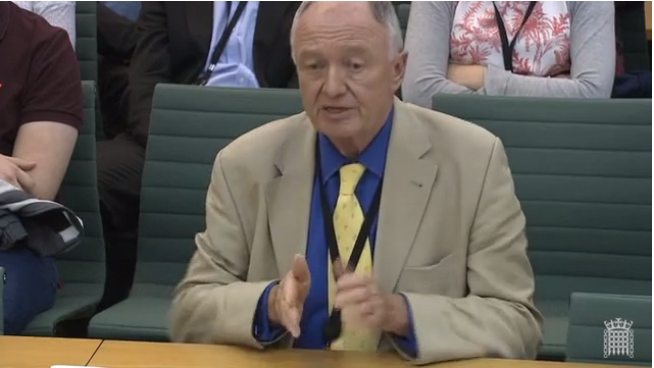There was the Queen’s Speech at the opening of Parliament just a few weeks back. And then there is Jonathan Arkush, President of the Board of Deputies of British Jews, gracing the session of the Home Affairs Select Committee with his presence on Tuesday. It is hard to say which of them was greeted with a greater display of obsequious flummery. It was almost as if, no surely that can’t be the case, the 10 MPs present were worried that if they didn’t out-Arkush Arkush they might be thought to be, well, just a little soft on antisemitism.

Arkush himself is fluent, plausible, and carefully moderate and modulated in his statements, or at least in most of them. He is definitely not related to that former Board of Deputies favourite, Jonathan Hoffman. But as he was scarcely tested by any searching questions, or attempts to tease out inconsistencies or hidden assumptions, he did have a rather easy ride. Certainly easy by comparison with Ken Livingstone’s experience an hour later. But we’ll come to that.
So here are some of the statements, claims and assumptions that Keith Vaz and co didn’t pick up on.
The EUMC Definition of Antisemitism. Arkush declared it “helpful, comprehensive and fit for purpose”, without of course mentioning that it tries to skew attention round from attitudes towards Jews to attitudes towards Israel. What he said about its origins demonstrates his barrister’s sleight of hand:
What the European Union Monitoring Centre did—they called it a working definition as opposed to something cast in stone—was to group together various behaviours that they regarded as exhibiting antisemitism. The Fundamental Rights Agency is now the agency concerned…
Two sleights of hand in one passage. First, no it wasn’t a working definition because they wanted it to be indefinitely adapted. It was a ‘working definition’ because the EUMC which commissioned the work declined to adopt it. Second sleight of hand: Any reader would get the impression from Arkush that the successor Fundamental Rights Agency had picked up the baton and was now running with the definition. But on the contrary FRA has actually abolished the definition, removing all trace of the definition from its website.
Singling out. Both Vaz and Arkush were big on this, especially on ‘Israel’s right to exist’. So
…if they say, “I don’t want anyone to have self-determination”…. and it is for the whole world, that is fine, but if it is specifically about Israel, they would be antisemitic.
This is Vaz, not Arkush, and was technically in the form of a question, but one expecting the answer ‘yes’. Which it got. To be fair, Labour MP David Winnick and SNP’s Stuart Macdonald did point out that should, say, Saudi Arabia be criticised for its policies that could not be assumed to be an expression of anti-Muslim feeling. This was the nearest anyone got to saying boo to this goose, to pointing out that the reason that Israel got so much critical attention was because of its 5 decades long repression of Palestinians human rights. That was not on the day’s agenda.
Hitler. Several of the MPs bowled Mr Arkush nice softballs about Hitler. There seemed general agreement that using the words Jews and Hitler in the same sentence, or paragraph, or interview without making it clear which was the bad guy was a plausible sign of at least closet antisemitism. But in this they were just getting their eye in for the coming assault on Ken Livingstone.
For this was definitely a game of two halves. After competing with each other to schmooze Jonathan Arkush, the MPs now competed with each other to see who could be most unpleasant to Ken Livingstone. They were painfully anxious to put their boots into a man who they thought was sufficiently down that they might be able to get in some wounding blows. I have to announce that the undisputed winner of the contest, with an unparalleled display of calculated and sneering disrespect and of arrogant grandstanding was Chuka Umunna.
Ken did not emerge victorious – how could he, after his confused and utterly inappropriate remarks on Vanessa Feltz’s BBC Radio London programme? (They were politically insensitive, and upset numbers of Jews; but that doesn’t make them antisemitic.) He was somewhat subdued, certainly less combative than we have known him. But he did not concede any ground to his critics. He expressed contrition, principally, only for having turned the conflagration over antisemitism into a raging inferno, and so having helped the enemies of Jeremy Corbyn.
In this game of two halves the MPS first disgraced themselves by sycophancy, and then by bullyboy behaviour. Surely there is a rule by which MPs can be suspended for bringing Parliament into disrepute.
By Jonathan Rosenhead





I suggest Jonathan listen to my interview with Feltz the next day Livingstone’s remarks were clear the Nazi’s did support Zionism. It also wasn’t inappropriate Zionism uses the Holocaust repeatedly to defend its state the bastard offspring off Nazism
Jonathan Rosenhead is right that in terms of clever, arrogant cross-examination skills, Umunna beat Livingstone, but to my mind the matter that should interest us is: Livingstone’s testimony reveals the power of Jonathan Freedland’s conflation of rejection of Israel and rejection of the right of self-determination of the Jews (or ‘some Jews’ or ‘the Jewish people).
Keith Vaz asked Livingstone [Question 84 at minute 15:37:55], “Do you believe that the people of Israel have a right to occupy their own land [sic.] and, therefore, have the right to self-determination?” Leaving aside Vaz’s factual error concerning ownership of Palestine, the two things were said literally in the same breath. Likewise, Vaz two questions later: “But do you believe in the right of Israel to occupy its own territory on the basis of self-determination?” In this formulation the Jewish state (in Palestine!) follows strictly from the Jewish right to self-determination.
This is important because this conflation enables the argument that denying Israel’s right to exist is antisemitic. Singling out the Jewish people to be denied this right, so this plausible argument goes, can follow only from a prejudice against the Jewish ethno-religious group.
So rejection of the concrete state of Israel is either derived from or equated with rejection of the abstract Jewish right to self-determination, and this serves as the middle term of a syllogism the conclusion of which is: Rejection of the state of Israel, as such, is antisemitic.
The trap was laid by Umunna who asked [Question 142 at minute 16:07:00], “For the sake of clarity, do you believe in the right of Jewish people to self-determination?” Here Livingstone rapidly answers “Yes” but Umunna has already continued, again in one breath, putting what to him is the exact same question: “Do you believe in the right of the State of Israel to exist?” So the two things are the same.
To make this point it isn’t required to take a stand on the large questions of whether all Jews form a ‘people’, whether self-determination can be achieved only through one’s own state, whether ethno-religiously defined and therefore undemocratic states are OK in principle, whether there was and is an objective ‘need’ of the Jews for a safe haven, or whether Jews have a ‘right’ to their own state.
All that is required is to ask where rather than whether. One can affirm an abstract right of Jews to self-determination, or to have their own state, but deny that they have a right to fulfil it through a state in Palestine, i.e. on land already inhabited by other people, who must largely be ethnically cleansed in order to realise the state in that place.
Or to ask at whose cost. We know the Palestinians paid the high price. The anti-Zionist position is that, whatever the consequences for many Jews, two wrongs do not make a right – the costs in death, maiming, imprisonment, banishment, poverty and humiliation were and are too high.
That is, we can acknowledge a Jewish right to self-determination, or better, take no stand on it. Then by showing that rejection of the real-life state of Israel, where it is and in light of its cost to the indigenous people, does not imply rejection of any right to self-determination, the antisemitism argument collapses.
Because Livingstone is a Zionist – at the hearing he affirms both his support for the state of Israel and the Zionist two-state solution – he must cave in to Umunna saying [Question 146 at minute 16:09:19]: “It was not wrong to create it.”
Neither the Labour Party nor Ken Livingstone have the wherewithal to disprove that rejection of Israel means hatred of Jews as Jews.